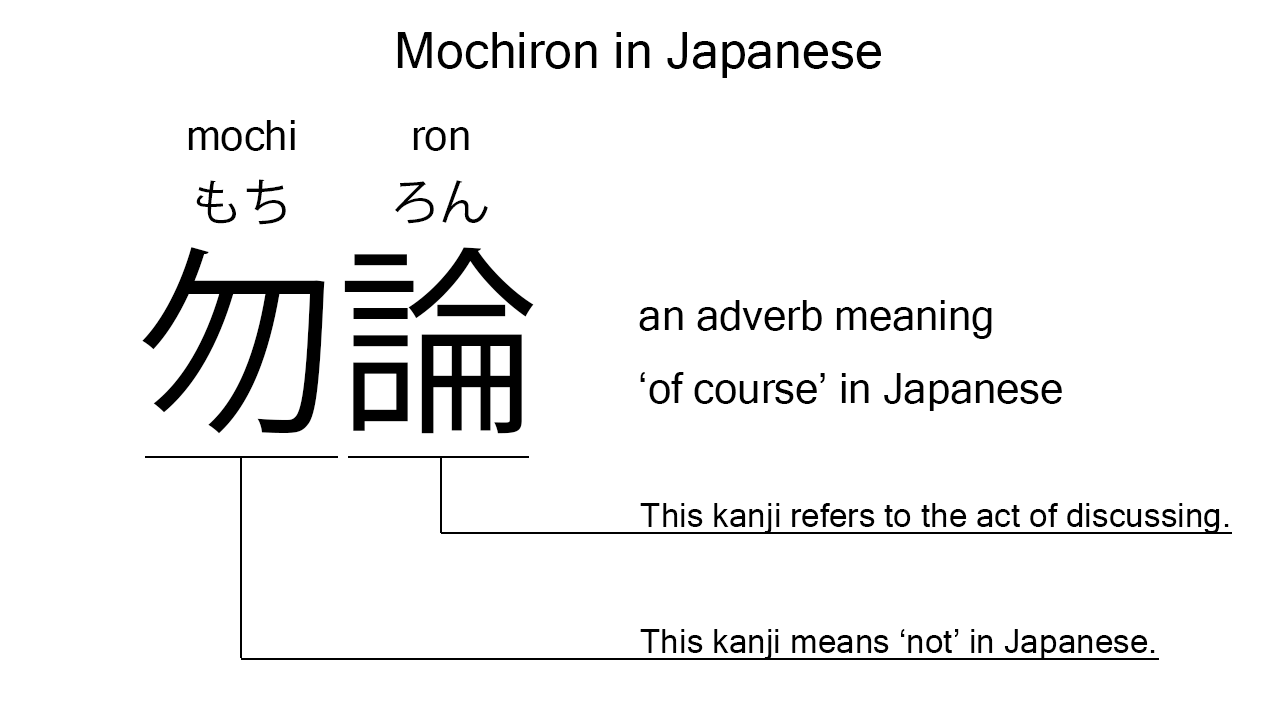What does “mochiron” mean in Japanese?
Native speakers say “mochiron” often to mean ‘of course’ in Japanese. Perhaps, some Japanese learners know this word as it is sometimes used in Japanese conversations. In this blog post, however, I will explain it in detail based on its kanji expression. And also, I will explain how to use it through example sentences. My explanations would help Japanese learners understand “mochiron” more clearly. Then, let’s get started!
Contents
Definition and meanings of “mochiron”
Let me start with the definition and meanings of “mochiron”.
- mochiron – 勿論 (もちろん) : an adverb meaning ‘of course’, ‘for sure’, ‘definitely’, ‘absolutely’, or ‘needless to say’ in Japanese.
Japanese native speakers use this adverb when they are very certain what has happened, what is going to happen, or what is true. So, this can work in more or less the same way as the English words written above.
The definition and meanings are not that difficult, I think. The meanings seem to be based on similar concepts. To understand this adverb more clearly, however, let me explain its kanji characters in detail, one by one.
What does “mochiron” literally mean in Japanese?
The kanji expression of “mochiron” consists of the following two kanji characters:
- 勿 : a kanji character used to add the meaning of ‘not’, ‘must not’, or such.
- 論 : a kanji character used to refer to the act of discussing or arguing.
From these two kanji characters, we can understand that “mochiron” literally means ‘not discuss’ in Japanese. This literal interpretation is not completely in line with the actual meanings, but still understandable, I think. When people are very certain what is true, they don’t have to discuss it.

When we meet new kanji expressions, we should check their kanji characters in detail to understand their meanings clearly and deeply. In many cases, kanji characters tell us a lot about the meanings of the expressions they form. Actually, here, we could get the better understanding of “mochiron” through the detailed kanji check above.
So far, I’ve explained the definition and meanings of “mochiron” together with its kanji characters. Then, let me explain how to use it through the example sentences below.
Example #1: how to say “of course” in Japanese
mochiron boku wa kanojo ga suki desu – 勿論僕は彼女が好きです (もちろんぼくはかのじょがすきです)
Of course I love her.
Below are the new words used in the example sentence.
- boku – 僕 (ぼく) : a pronoun meaning ‘I’ in Japanese. This is used mainly by boys and young males.
- wa – は : a binding particle working as a case marker or topic marker. In the example, this works after “boku” to make the subject in the sentence.
- kanojo – 彼女 (かのじょ) : a pronoun meaning ‘she’ in Japanese.
- ga – が : a case particle used to make the subject word or the object word in a sentence. In the example, this is used after “kanojo” to make the object in the sentence.
- suki – 好き (すき) : the stem part of the na-adjective, “sukina”, which means ‘favorite’ in Japanese. Native speakers, however, often use this as an individual word to mean ‘to like’ or ‘to love’ in Japanese. In the example, this is used to mean ‘to love’.
- desu – です : an auxiliary verb used after a noun or adjective to make it polite. Probably, this is well known as a part of Japanese desu form. In the example, this is used after “suki” to make it sound polite.
This is a typical usage of “mochiron”. In this example, it works at the beginning of the sentence to say “of course” in Japanese. When we are very certain what is true, we can use this adverb.
Example #2: another usage of “mochiron”
kanojo wa mochiron sore wo shira nai – 彼女はもちろんそれを知らない (かのじょはもちろんそれをしらない)
Of course she doesn’t know that.
Below are the new words used in the example sentence.
- sore – それ : a pronoun used to refer to something not close to the speaker. In the example, this is used to mean ‘that’ in Japanese.
- wo – を : a case particle used to make the object word in a sentence. In the example, this is used after “sore” to make the object in the sentence.
- shira – 知ら (しら) : one conjugation of the verb, “shiru”, which means ‘to know’ in Japanese. In the example, it has been conjugated for the better connection with its following word.
- nai – ない : an auxiliary verb used after a verb, adjective, or auxiliary verb to deny its meaning. Probably, this is well known as a part of Japanese nai form. In the example, this is used after “shira” to deny its meaning.
This is another typical usage of “mochiron”. In this example, it works in the middle of the sentence to say “of course” in Japanese. It’s also worth mentioning here that even native speakers use the hiragana expression quite often.
Summary
In this blog post, I’ve explained the definition and meanings of “mochiron” in detail based on its kanji expression. And also, I’ve explained how to use it through the example sentences. Let me summarize them as follows.
- mochiron – 勿論 (もちろん) : an adverb meaning ‘of course’, ‘for sure’, ‘definitely’, ‘absolutely’, or ‘needless to say’ in Japanese. Japanese native speakers use this adverb when they are very certain what has happened, what is going to happen, or what is true. So, this can work in more or less the same way as the English words written above. It’s also worth mentioning here that even native speakers use the hiragana expression quite often.
Hope my explanations are understandable and helpful for Japanese learners.